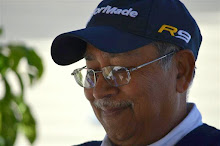Friday, January 23, 2026
The Brass Lamp of Bagha Beach
Saturday, January 17, 2026
Between two lives
Friday, January 09, 2026
Sanghamitra: Daughter of the Bodhi Tree
Sanghamitrā: Daughter of the Bodhi Tree
The palace gardens of Pāṭaliputra rustled with birdsong. Young Sanghamitrā often slipped away from her attendants to sit beneath a wide peepal tree, tracing her fingers across its bark. She would whisper to the leaves, “Why do you give shade without asking anything in return?” Nature answered her in silence, and she learned its lesson of patience.
But the palace no longer rang with laughter. The Kalinga war had ended, leaving behind not triumph but ashes. Emperor Aśoka, once called Chandashoka—fierce Aśoka—walked the halls with restless eyes.
One evening Sanghamitrā found him by the lotus pond, his sword rusting at his side.
“Father,” she asked softly, “why do you no longer dine with us? Why do you stare so at the ground?”
Aśoka’s voice was hollow.
“Child, I have seen too much blood. The cries of mothers and children follow me even in sleep. What is an empire worth, if it is built on suffering?”
“Then let the empire be built on healing,” Sanghamitrā said, her young face glowing with conviction. “Like the trees heal with their shade. Teach the people another way.”
Aśoka looked at her, startled at the wisdom in her words. “Perhaps the Buddha’s path of Dharma is the only way left for me,” he whispered.
Years later, Sanghamitrā watched her elder brother Mahinda depart for Sri Lanka to spread the Buddha’s teaching. She too felt a stirring, as though the island called her name. One evening she approached her father.
“Father, if Mahinda can carry the message of the Buddha, so can I. But I wish to plant not just words—a living symbol.”
Aśoka raised his brows. “You mean the Bodhi tree, the very tree under which the Buddha awakened?”
“Yes,” she said, her eyes bright. “A branch from that tree. If it thrives in Lanka’s soil, the people will know that Dharma cannot be uprooted.”
The voyage began under a clear sky. The Bodhi sapling, wrapped in silk and earth, was placed at the center of the ship as if it were a king. Sanghamitrā, now a nun in saffron robes, sailed with eleven companions.
But the sea turned dark. Storm winds rose, waves crashed like walls of black glass. Sailors clung to the mast, crying out in fear.
“The sea spirits are angry—we will sink!” one shouted.
Sanghamitrā stood firm, her hands on the Bodhi sapling. “If this tree lives, the Dharma will live. Fear not. Even the storm must bow to truth.”
She began to chant verses of the Buddha. Her voice, steady against thunder, calmed the hearts around her. By dawn, the storm had passed, leaving the sea a silver mirror.
At Anuradhapura, King Devanampiya Tissa and his queen awaited her arrival. Drums rolled as the Bodhi sapling was carried ashore. The queen clasped Sanghamitrā’s hand.
“From today,” she said, “you are my sister.”
But not all were pleased. Somadeva, the Brahmin priest of the court, whispered to the king, “Do not let a foreign woman rule your soul. She will steal your throne of faith.”
A tribal chief named Kurung, famed for his “mystical powers,” joined in. “Our spirits bow to no foreign tree,” he sneered, shaking a talisman of bones.
Yet the queen stood resolute. “This woman brings no weapons, only service. Let us judge her by deeds, not fear.”
Sanghamitrā did not answer with sermons. She and her nuns tended to the sick, washed the wounds of beggars, and fed hungry children. Word spread: The lady in saffron heals without asking for gold. She serves without pride.
One day the king, disguised, went among his people. He saw Sanghamitrā kneeling by a leper, washing his sores with her bare hands.
Returning to the palace, he told the queen, “I saw no goddess today, only a woman who chose to be less than all, so that all may rise. Her soul is selfless.”
When the Bodhi tree was finally planted at Anuradhapura, Somadeva scoffed, “It will wither.”
But the sapling grew, its leaves rustling like whispered prayers. Even Kurung, the tribal chief, bowed at its roots.
Thus Sanghamitrā was no longer just Aśoka’s daughter. She became the Mother of the Bhikkhunī Order in Lanka, remembered for planting both a tree and a way of life that gave shade to generations.
And under its branches, people would tell their children: “Once, a woman crossed the sea, carrying a tree in her heart. That is why we live in Dharma’s shade today.”
---
Footnote
Sanghamitra was the daughter of Emperor Ashoka and Queen Devi, renowned for her role in spreading Buddhism to Sri Lanka in the 3rd century BCE.
Early Life
Born around 282 BCE in Vidisha, she married briefly before renouncing worldly life to become a Buddhist nun, renamed Ayapali. Her brother Mahinda shared her commitment to Buddhism.
Mission to Sri Lanka
In 252 BCE, at King Devanampiya Tissa's request, Ashoka sent Sanghamitra with a Bodhi tree sapling, which she planted in Anuradhapura. She converted royal women, established a nunnery, and trained nuns.
Legacy
Sanghamitra dedicated her life to proselytizing among women, dying around 203 BCE; the Sri Lankan king honored her with personal funeral rites. The Bodhi tree remains a sacred site.







